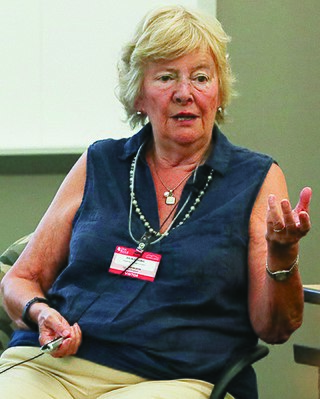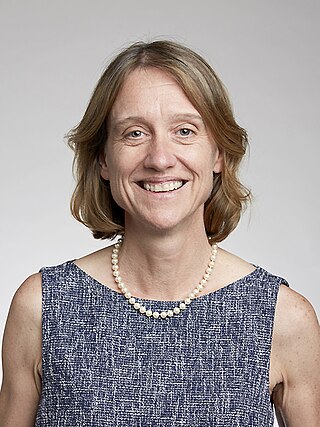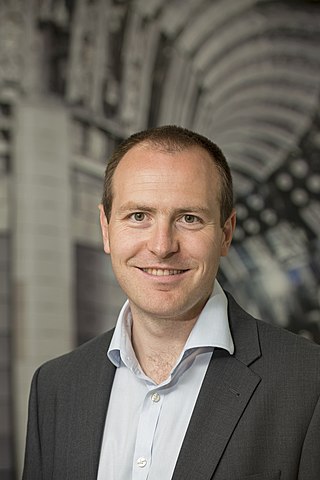
Julia Elizabeth King, Baroness Brown of Cambridge, is a British engineer and a crossbench member of the House of Lords, where she chairs the Select Committee on Science and Technology. She is the incumbent chair of the Carbon Trust and the Henry Royce Institute, and was the vice-chancellor of Aston University from 2006 to 2016.

Dame Julia Stretton Higgins is a British polymer scientist. Since 1976 she has been based at the Department of Chemical Engineering at Imperial College London, where she is emeritus professor and senior research investigator.
Sir Robert Keith O'Nions FRS HonFREng, is a British scientist and ex-President & Rector of Imperial College London. He is the former Director General of the Research Councils UK as well as Professor of the Physics and Chemistry of Minerals and Head of the Department of Earth Sciences at the University of Oxford.
Dame Jean Olwen Thomas, is a Welsh biochemist, former Master of St Catharine's College, Cambridge, and Chancellor of Swansea University.

Dame Ann Patricia Dowling is a British mechanical engineer who researches combustion, acoustics and vibration, focusing on efficient, low-emission combustion and reduced road vehicle and aircraft noise. Dowling is a Deputy Vice-Chancellor and Professor of Mechanical Engineering, and from 2009 to 2014 she was Head of the Department of Engineering at the University of Cambridge, where she was the first female professor in 1993. She was President of the Royal Academy of Engineering from 2014 to 2019, the Academy's first female president.
Dame Lynn Faith Gladden is the Shell Professor of Chemical Engineering at the University of Cambridge. She served as Pro-vice-chancellor for research from 2010 to 2016.

Dame Carol Vivien Robinson, is a British chemist and former president of the Royal Society of Chemistry (2018–2020). She was a Royal Society Research Professor and is the Dr Lee's Professor of Physical and Theoretical Chemistry, and a professorial fellow at Exeter College, University of Oxford. She is the first director of the Kavli Institution for Nanoscience Discovery, University of Oxford, and she was previously professor of mass spectrometry at the chemistry department of the University of Cambridge.

Christofer "Chris" Toumazou, CEng is a British Cypriot electronic engineer. He is perhaps best known for inventing a fast and portable means of genome sequencing, following his 13-year-old son's diagnosis with end stage kidney failure through a rare genetic mutation.
Derek John Fray is a British material scientist, and professor at the University of Cambridge.
Geoffrey Frederick Hewitt was a British chemical engineer, and Emeritus Professor at Imperial College London, where from 1993 to 1999 he was the Courtaulds Professor of chemical engineering.

Sir Steven Charles Cowley is a British theoretical physicist and international authority on nuclear fusion and astrophysical plasmas. He has served as director of the United States Department of Energy (DOE) Princeton Plasma Physics Laboratory (PPPL) since 1 July 2018. Previously he served as president of Corpus Christi College, Oxford, since October 2016. and head of the EURATOM / CCFE Fusion Association and chief executive officer of the United Kingdom Atomic Energy Authority (UKAEA).

The Department of Chemical Engineering, Imperial College London is the centre of teaching and research in chemical and process engineering at Imperial College London, occupying the Aeronautics and Chemical Engineering Extension (ACEX), Bone and Roderic Hill buildings, on the South Kensington campus. Formally inaugurated in 1912, the department has over 40 faculty members, 100 postdoctoral researchers, 200 PhD researchers, 80 taught postgraduates, and 500 undergraduates. The department ranks 7th on QS's 2018 world rankings.

David William Hight is a senior consultant at the Geotechnical Consulting Group, a company providing high-level expertise in the field of geotechnical engineering and well known for bridging the gap between research and engineering practice.
Andrew Tym Hattersley CBE FRS is a Professor of Molecular Medicine at the University of Exeter and is known for his research in monogenic diabetes. He was elected a Fellow of the Royal Society in 2010. He is also an Emeritus Senior Investigator at the National Institute for Health and Care Research (NIHR).

Julia Alison Noble is a British engineer. She has been Technikos Professor of Biomedical Engineering at the University of Oxford and a fellow of St Hilda's College since 2011, and Associate Head of the Mathematical, Physical and Life Sciences Division at the university. As of 2017, she is the chief technology officer of Intelligent Ultrasound Limited, an Oxford spin-off in medical imaging that she cofounded. She was director of the Oxford Institute of Biomedical Engineering (IBME) from 2012 to 2016. In 2023 she became the Foreign Secretary of The Royal Society.

Dame Angela Rosemary Emily Strank is head of downstream technology and chief scientist of BP, responsible for technology across all the refining, petrochemicals, lubricants and fuels businesses.

Sir Robin William Grimes is chief scientific adviser in the Ministry of Defense (MoD) for nuclear science and technology and professor of materials physics at Imperial College London. From February 2013 to August 2018 he served as chief scientific adviser to the Foreign and Commonwealth Office (FCO). Since November 2021 he has been Foreign Secretary of The Royal Society

Sir Ian Trevelyan ChapmanFRS is a British physicist who is the chief executive of the United Kingdom Atomic Energy Authority (UKAEA).

The Department of Materials is responsible for the teaching and research in materials science and engineering at Imperial College London, occupying the Royal School of Mines and Bessemer buildings on the South Kensington campus. It can trace its origins back to the metallurgy department of the Government School of Mines and Science applied to the Arts, founded in 1851.
The Novo Nordisk Prize is an annual award presented to acknowledge exceptional contributions within the fields of medical and health sciences. It is specifically aimed at individuals who have demonstrated outstanding research or innovation that has the potential to advance medical science, particularly in areas related to diabetes, endocrinology, and biopharmaceutical science. The prize is administered by the Novo Nordisk Foundation, an independent Danish enterprise foundation.














